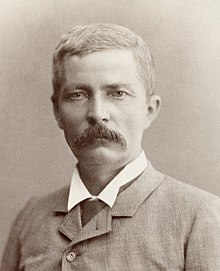International African Association
front organization
The International African Association (in full, "International Association for the Exploration and Civilization of Central Africa") was a front organization established by the guests at the Brussels Geographic Conference of 1876, an event hosted by King Leopold II of Belgium who volunteered space on his private grounds at the Palace of Laeken in Brussels for the Association's headquarters. The Association was succeeded by the short-lived "Committee for Studies of the Upper Congo", and the International Association of the Congo, which eventually dissolved and merged into the Congo Free State.



| This geography-related article is a stub. You can help out with Wikiquote by expanding it! |
Quotes about the International African Association
edit- The International African Association, formed for purely philanthropical purposes, was the outcome of a geographical conference which met at Brussels in 1876. Leopold II, King of the Belgians, was made its president by the unanimous agreement of distinguished representatives, men from nearly all of the European countries and from the United States. The programme which was adopted had the treble end in view “of organizing the scientific exploration of the still unknown regions of Africa, of opening up paths to civilization, and of seeking the means of gradually extinguishing the traffic in slaves."
- Papers relating to the foreign relations of the United States, transmitted to congress, with the annual message of the President, December 8, 1885. Mr. Tisdel to Mr. Frelinghuysen, London, November 23, 1884. (Received December 9.)
- To open to civilization the only part of the globe not yet explored, to penetrate the shadows that envelope its entire population; This is, I make bold to say a crusade worthy of this century of progress, and i am happy to note that public opinion is favorable to its undertaking.
- Belgian Congo - American survey 1956-57 By Robert G.Mc Gregor, Consul General of the USA in the Belgian Congo. Leopold II describing the purpose of the International African Association
- We must ensure that it is not too clear that the Association of Congo and the African Association are two different businesses. The public doesn't understand that. It will assume that there are two phases, the first of which is no longer relevant.
- Leopold II, Het hele Verhaal, Johan Op De Beeck Horizon, 2020 ISBN 9789463962094 Leopold II in a letter to one of his staff members.
- This African question in which I never believed the slightest future ... hangs over me in the most unpleasant way. ... My very square opinion was, and I expressed it very forcefully ... to withdraw from it.
- All the King's Men' A search for the colonial ideas of some advisers and "accomplices" of Leopold II (1853-1892). (Hannes Vanhauwaert), 4. Viceroys without colonial aspirations? Jules Devaux (1828-1886) When the case of colonization in Central Africa was already five years advanced, Jules Devaux even started behaving rebelliously. He wrote Van Loo in February 1883. STENGERS, J. Congo: Myths et réalités, 70, footnote 2.
- Obviously, we are leaving the humanitarian and scientific plan to risk a business whose commercial aspects seem to lack sufficient bases, and which, on top of that, seems fraught with national and international difficulties.
- All the King's Men' A search for the colonial ideas of some advisers and "accomplices" of Leopold II (1853-1892). (Hannes Vanhauwaert), 8. The Short Colonial Careers of Jules Greindl, Eugène père Beyens, Eugène Napoléon Beyens and Maximilien Strauch, A Skeptical Jules Greindl (1835-1917) Meanwhile, the spring had broken with Baron Jules Greindl. Two years earlier, he had been accepted as secretary-general of an organization that set itself an international humanitarian and neutral mission, but since then Leopold II, as president of the International African Association, has pursued a policy that became increasingly Belgian and territorial. WILLEQUET, J. “Jules Griendl, une grande figure de notre diplomatie”, 12. Zie ook: WILLEQUET, J. Le baron Lambermont, 78-79.
See also
editExternal links
edit- Timeline for Congo — History Commons